UAB study explores the link between brain inflammation and Parkinsons

A new research study conducted by the University of Alabama at Birmingham supports the premise that there is a connection between inflammation and Parkinson’s disease early in the disease’s progression. The findings were published online in Movement Disorders. The study found reason to accept the conclusion that central inflammation is observed early in the disease process of Parkinson’s. The study found that inflammation is independent of treatment for the disease and correlates with cognitive features and certain peripheral markers of inflammation. Dr. Talene Yacoubian is a professor in the Department of Neurology at Marnix E. Heersink School of Medicine. “An association between inflammation and Parkinson’s is well known, but a fundamental question remains unanswered,” said Dr. Yacoubian. “Does inflammation play a role in the onset of Parkinson’s, or is it a byproduct of the disease itself? Our findings show that inflammation is present in the early stages of the disease.” Yacoubian’s team studied 58 people newly diagnosed with Parkinson’s disease and compared them with 62 healthy control subjects. “Enrolling study subjects early in their disease progression was significant,” said Yacoubian. “We wanted to see if inflammation was present early on in the disease, before patients had even begun on Parkinson’s medications.” Yacoubian holds the John A. and Ruth R. Jurenko endowed professorship at UAB. The team used PET imaging to target translocator protein, or TSPO, a protein found primarily in microglial cells and other immune cells in the brain. Increased TSPO is associated with inflammation. Yacoubian and colleagues used a radioligand developed in Europe called 18F-DPA-714. Once injected into the bloodstream, this radioactive molecule binds to TSPO, causing it to light up on PET imaging. “We found elevations in TSPO binding in untreated subjects at early stages of Parkinson’s, indicating the presence of inflammation,” Yacoubian said. “Our data clearly demonstrate that increased TSPO binding is present in Parkinson’s independent of treatment effects. Our multimodal study provides further evidence that TSPO signal as measured by 18F-DPA-714 is a marker of inflammation.” Economic developer Dr. Nicole Jones told Alabama Today, “UAB continues to meet the medical needs of residents in central Alabama and is known as a research and development leader. Through R&D, physicians learn more about debilitating diseases, which can help identify potential treatments. Congratulations to UAB on the grant awarded by the National Institute of Neurological Disorders and Stroke/NIH/DHHS to further study Parkinson’s. Your continued pursuit has the opportunity to help shape the lives of Alabamians and the world.” Yacoubian says several key gaps remain as to the role of inflammation in Parkinson’s disease, including the potential effects of Parkinson’s treatments on inflammation, whether or not inflammation changes over time, and whether or not pro-inflammatory signals predict a more rapid progression of the disease. Early symptoms of Parkinson’s can include tremors in hands, slowness and paucity of movement, limb stiffness, and gait and balance problems. Non-motor symptoms of Parkinson’s include depression, anxiety, apathy, hallucinations, constipation, orthostatic hypotension, sleep disorders, loss of sense of smell, and a variety of cognitive impairments. There is no cure for Parkinson’s, but treatments and lifestyle changes can benefit persons diagnosed with the ailment. Pope John Paul II, actor Michael J. Fox, boxer Muhammed Ali, President George H. Bush, evangelist Billy Graham, former presidential candidate Jesse Jackson, and former attorney general Janet Reno are notable people diagnosed with Parkinson’s. To connect with the author of this story or to comment, email brandonmreporter@gmail.com.
In Selma, Joe Biden says right to vote remains under assault
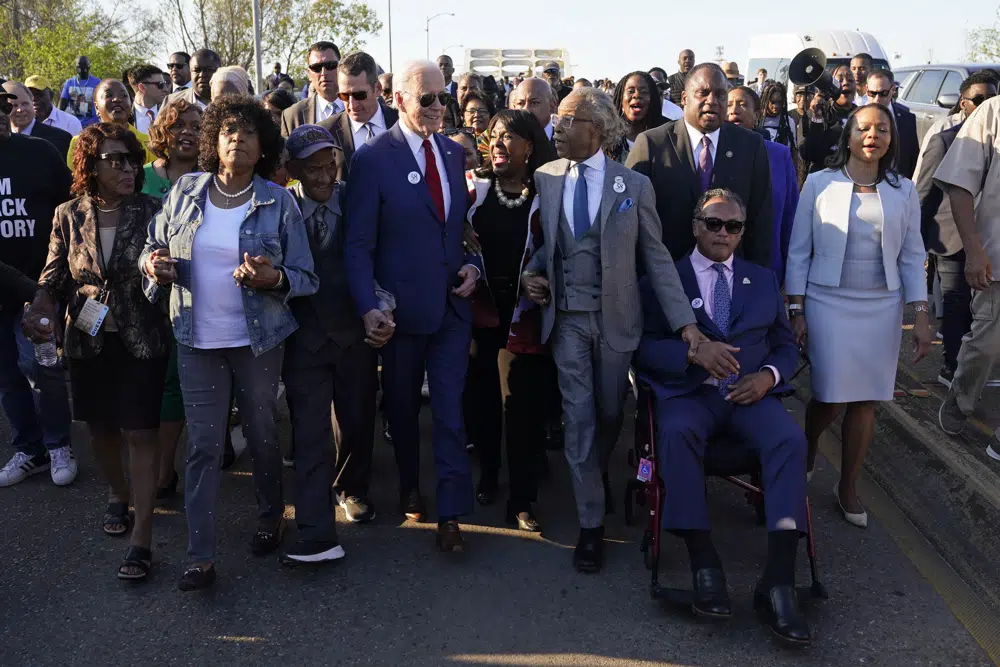
President Joe Biden used the searing memories of Selma’s “Bloody Sunday” to recommit to a cornerstone of democracy, lionizing a seminal moment from the civil rights movement at a time when he has been unable to push enhanced voting protections through Congress, and a conservative Supreme Court has undermined a landmark voting law. “Selma is a reckoning. The right to vote … to have your vote counted is the threshold of democracy and liberty. With it anything’s possible,” Biden told a crowd of several thousand people seated on one side of the historic Edmund Pettus Bridge, named for a reputed Ku Klux Klan leader. “This fundamental right remains under assault. The conservative Supreme Court has gutted the Voting Rights Act over the years. Since the 2020 election, a wave of states and dozens and dozens of anti-voting laws fueled by the ‘Big Lie’ and the election deniers now elected to office,” he said. As a candidate in 2020, Biden promised to pursue sweeping legislation to bolster protection of voting rights. Two years ago, his 2021 legislation, named after civil rights leader John Lewis, the late Georgia congressman, included provisions to restrict partisan gerrymandering of congressional districts, strike down hurdles to voting and bring transparency to a campaign finance system that allows wealthy donors to bankroll political causes anonymously. It passed the then-Democratic-controlled House, but it failed to draw the 60 votes needed to advance in a Senate under control by Biden’s party. With Republicans now running the House, passage of such legislation is highly unlikely. “We know we must get the votes in Congress,” Biden said, but there seems no viable path right now. The visit to Selma was a chance for Biden to speak directly to the current generation of civil rights activists. Many feel let down because of the lack of progress on voting rights, and they are eager to see his administration keep the issue in the spotlight. Few moments have had as lasting importance to the civil rights movement as what happened on March 7, 1965, in Selma and in the weeks that followed. Some 600 peaceful demonstrators led by Lewis and fellow activist Hosea Williams had gathered that day, just weeks after the fatal shooting of a young Black man, Jimmie Lee Jackson, by an Alabama trooper. Lewis and the others were brutally beaten by Alabama troopers and sheriff’s deputies as they tried to cross the Edmund Pettus Bridge at the start of what was supposed to be a 54-mile walk to the state Capitol in Montgomery as part of a larger effort to register Black voters in the South. “On this bridge, blood was given to help redeem the soul of America,” Biden said. The images of the police violence sparked outrage across the country. Days later, civil rights leader Martin Luther King Jr. led what became known as the “Turnaround Tuesday” march, in which marchers approached a wall of police at the bridge and prayed before turning back. President Lyndon B. Johnson introduced the Voting Rights Act of 1965 eight days after “Bloody Sunday,” calling Selma one of those rare moments in American history where “history and fate meet at a single time.” On March 21, King began a third march, under federal protection, that grew by thousands by the time they arrived at the state Capitol. Five months later, Johnson signed the bill into law. This year’s commemoration came as the historic city of roughly 18,000 was still digging out from the aftermath of a January EF-2 tornado that destroyed or damaged thousands of properties in and around Selma. The scars of that storm were still evident Sunday. Blocks from the stage where Biden spoke, houses sat crumbled or without roofs. Orange spray paint marked buildings beyond salvage with instructions to “tear down.” “We remain Selma strong,” Mayor James Perkins said, adding that “we will build back better.” He thanked Biden for approving a disaster declaration that helped the small city with the cost of debris cleanup and removal. ADVERTISEMENT Before Biden’s visit, the Rev. William Barber II, a co-chair of Poor People’s Campaign, and six other activists wrote Biden and members of Congress to express their frustration with the lack of progress on voting rights legislation. They urged Washington politicians visiting Selma not to sully the memories of Lewis and Williams and other civil rights activists with empty platitudes. “We’re saying to President Biden, let’s frame this to America as a moral issue, and let’s show how it effects everybody,” Barber said in an interview. Among those sharing the stage with Biden before the march across the bridge were Barber, the Rev. Jesse Jackson, Martin Luther King III, and the Rev. Al Sharpton. On the bridge crossing, marchers sang “This Little Light of Mine” and “We Shall Overcome,” and, following tradition, once they reached the point where Lewis and others were told in 1958 that they were on an unlawful march, they stopped and prayed. Water bottles were passed out to some who had gathered to hear Biden, and at least one person was taken away on a stretcher because of the upper-70s heat. Some had waited hours in the sun before relief came from shadows cast by nearby buildings. Delores Gresham, 65, a retired healthcare worker from Birmingham, arrived four hours early, grabbing a front-row spot so her grandchildren could hear the president and see the commemoration. “I want them to know what happened here,” she said. In his remarks, Biden said, “Everyone should know the truth of Selma.” And the president took a veiled dig at a high-profile Republican, Florida Gov. Ron DeSantis, when he said: “We should learn everything. The good, the bad, the truth, who we are as a nation.” DeSantis’ administration has blocked a new Advanced Placement course on African American studies from being taught in high schools, saying it violates state law and is historically inaccurate. Last year, he signed legislation that restricts certain race-based conversations and analysis in schools and businesses. More recently, his budget office called on state colleges to submit spending information on programs related to diversity, equity and inclusion, and critical
George Wallace Jr.: 50th anniversary of George Wallace assassination attempt offers opportunity for reflection
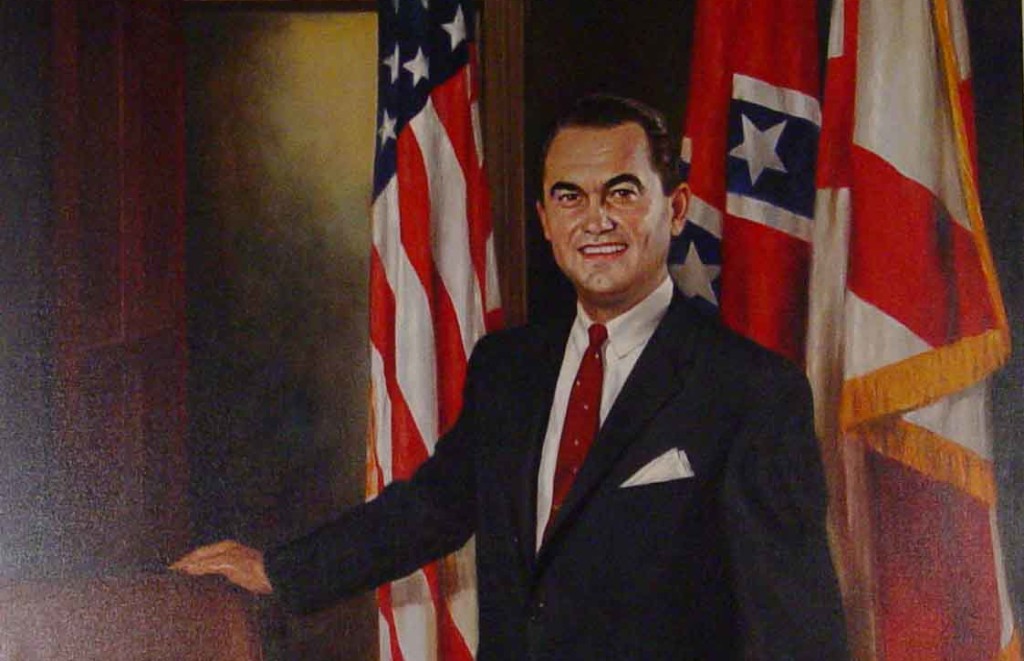
Fifty years ago, on May 15, 1972, I was a student at the University of Alabama and in my Tuscaloosa apartment when a “Special Report” on the television announced that my father, Gov. George C. Wallace, had been shot and critically injured in an assassination attempt on his life. The frontrunner for the Democratic presidential nomination at the time, Dad had been campaigning in Maryland on the eve of that state’s primary. The Michigan primary was scheduled for the next day, as well, and polling predicted that my father would carry both states by wide margins. It was at a parking lot rally in Laurel, Maryland where Arthur Bremer, a troubled, 21-year-old busboy from Milwaukee, took five fateful shots and wounded my father in the chest and abdomen as he was shaking hands in the crowd. Dad later told me that he was immediately aware his injuries were serious, and when he hit the ground, he purposely turned his head, closed his eyes, and pretended to be dead in hopes that a possible second gunman would choose not to shoot. Despite the chaos surrounding him, he had felt a certain peace and finality come over him as he wrongly assumed his wounds would be fatal. A Secret Service agent had kneeled over him in a protective position, but his drawn gun was dangerously close to Dad’s head. “I wish you wouldn’t point that at me – I have been shot enough for one day,” he told the agent. Bremer’s flurry of gunfire had also resulted in Secret Service agent Nick Zarvos being shot in the neck, Alabama State Trooper E.C. Dothard, a member of the gubernatorial security detail, receiving a graze to the stomach, and Dora Thompson, a campaign volunteer from Hyattsville, Maryland, suffering a knee wound after a bullet ricocheted off of the asphalt. A diary that Bremer kept for months stated his intention to “do something bold and dramatic” and indicated he had originally intended to assassinate President Richard Nixon. Stalking the president on his various travels, Bremer got close enough to take a shot at an economic summit in Ottawa, Canada, but the strong Secret Service presence surrounding the chief executive prompted him to change plans and target my father – the most likely future president – instead. Within minutes of receiving the news, state troopers arrived at my apartment door, whisked me to the airport, and placed me aboard a private jet along with Charlie Snider, the national chairman of the Wallace presidential campaign, press secretary Billy Joe Camp, and a handful of others. We soon arrived at Holy Cross Hospital, where my father had been taken by ambulance and was undergoing five hours of emergency surgery. The attending doctors told us that his already grave injuries were complicated by the fact that just prior to the rally, Dad and his traveling campaign staff had stopped at a Howard Johnson’s restaurant, where he ate his usual lunch of hamburger steak and fries doused in ketchup. The bullets had caused the undigested food to explode within his abdomen, and the lingering peritonitis blood infection and abscesses that followed would almost claim his life. When I walked into the recovery room, my father was still heavily sedated and many of the stitches on his chest and stomach were visible. He reached out with a look I had never seen – one of a man who had been to death’s door and was back among the living, reunited with his family. I have never forgotten that look. It soon became clear that the injuries had paralyzed my father from the waist down, and though we held hope that he would eventually regain use of his legs, those particular prayers were left unanswered. He remained hospitalized at Holy Cross for several weeks as he fought infections and held the continuing specter of death at bay. Once he regained strength, he received visits from notable leaders that included President Nixon, Senator George McGovern, Congresswoman Shirley Chisholm, and Ethel Kennedy, whose husband, Robert Kennedy, had been killed while campaigning for the presidency in 1968. Cards, letters, telegrams, and flowers flowed into the hospital by the thousands. Upon his release, Dad flew to Miami on a military medical aircraft, which was provided by President Nixon, to appear at the 1972 Democratic National Convention, where McGovern, a committed liberal, would claim the nomination. My father’s forced absence from the campaign trail had allowed his competitor to secure the required delegates. During his convention remarks, Dad warned the Democrats that embracing the extreme left and its ultra-liberal agenda would cost the party the support of the rank-and-file, blue-collar, middle-class families that served as its foundation and doom it to lose the Deep South states in future elections. Like a clairvoyant with a crystal ball, all of the predictions he made those years ago have come true today. As my father spoke, a handful of liberal delegates tried to shout him down, and some marched around the convention hall wearing paper masks depicting Arthur Bremer, which Wallace supporters ripped from their faces. The vast majority, though, gave him a warm reception and appreciated the history of the moment. His mission complete, it was time to return to his beloved Alabama. My father would serve two more terms as governor and run for president a fourth time in 1976, though he lost the nomination to Jimmy Carter, a former Georgia governor who had once been a Wallace supporter. Retirement from public office in 1987 would offer him the opportunity for reflection in his later years, and his relationship with God grew significantly. One of the most enduring and revealing testaments to my father’s deepening faith came in an incredible letter of forgiveness he wrote with no fanfare or public announcement to his assailant, Arthur Bremer, in 1995. A copy of the missive was discovered tucked away in Dad’s files years after it was written. “I love you and have forgiven you, and if you will ask Jesus Christ into your heart,
Alabama NAACP honors difference makers at annual gala
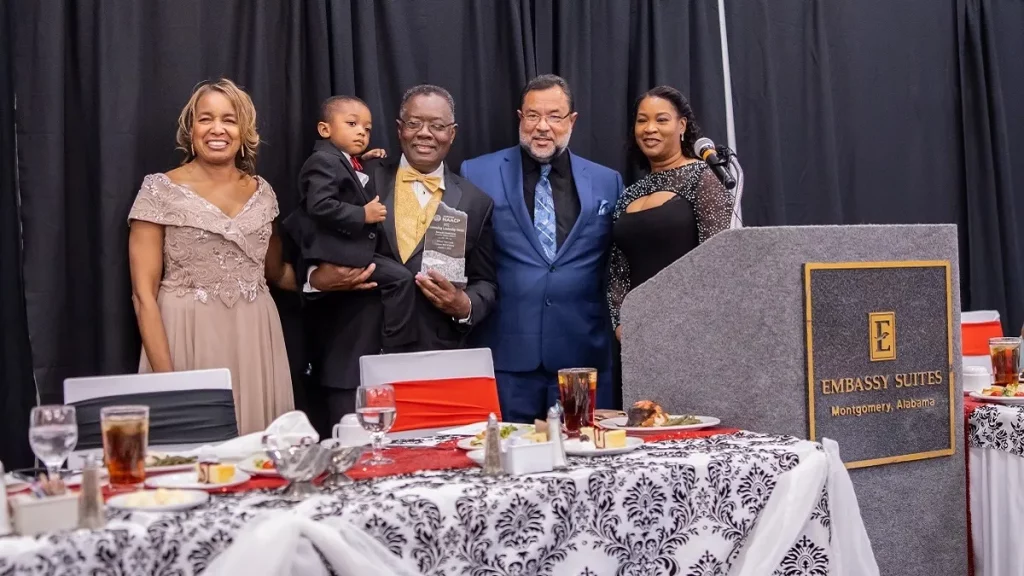
The Alabama NAACP recently held its annual Bridge Crossing Gala. The event, in its 57th year, was at the Embassy Suites Conference Center in Montgomery. Speakers included U.S. Rep. Terri Sewell, Montgomery Mayor Steven Reed, and the Rev. Jesse Jackson. Darlena Battle, Corporate Relations specialist for Alabama Power, emceed the event. As part of the festivities, several people and organizations were honored for their commitment to diversity and building a better Alabama. Students and NAACP members made up the honorees, who included: Outstanding Leadership: Benard Simelton, Alabama NAACP president. Foot Soldiers Scholarship Contributor: Regions Bank. Shining Star Award: Carlos King, creator and executive producer of the “Love & Marriage Huntsville” reality show. Foot Soldiers Scholarship Award: Alyssa Miles, Andrea Wainwright. Gamechanger: Jasmine Washington Cook, Raven Perry-Beach. Trailblazer: Patricia A. Haley. Foot Soldier: Bobby Diggs. Humanitarian: Alec Barnett. Living History: Les Brown. Unsung Hero: Brenda Debose. The NAACP was founded in 1909 with a vision to “ensure a society in which all individuals have equal rights and there is no racial hatred or racial discrimination,” according to the association’s website. It is the nation’s largest civil rights organization, with “over 2 million activists fighting for change and for justice.” For more information about the NAACP and its programs, please visit www.alnaacp.org. Republished with the permission of the Alabama News Center.
Elizabeth Warren’s outreach to black voters could help VP standing
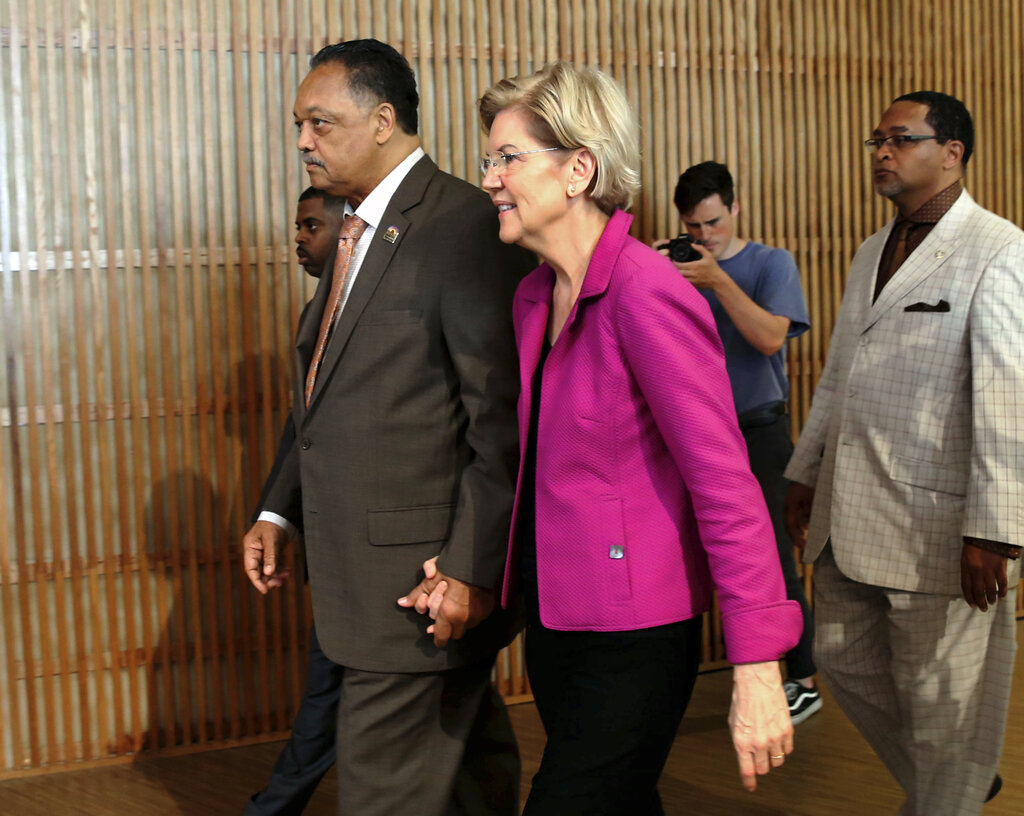
The pair speak frequently, and Warren hosted a virtual fundraiser for Biden on Monday that raised an impressive $6 million.
Stakes rise for Bernie Sanders heading into Michigan primary
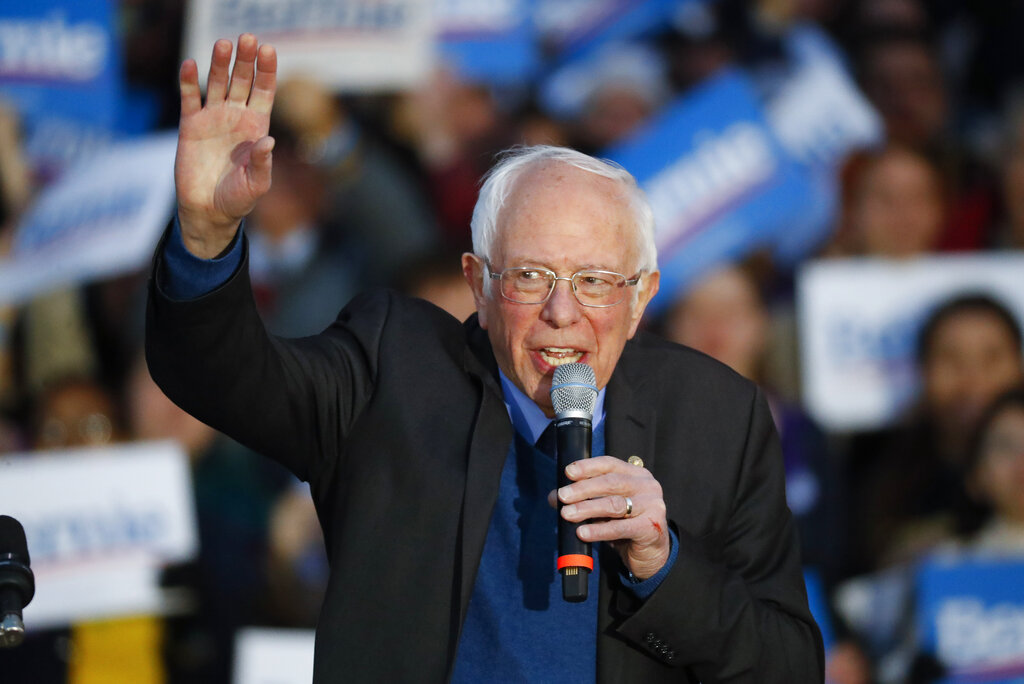
Michigan and five other states hold presidential contests on Tuesday at a critical point in the Democratic race.
Kamala Harris endorses Joe Biden; Jesse Jackson backs Bernie Sanders
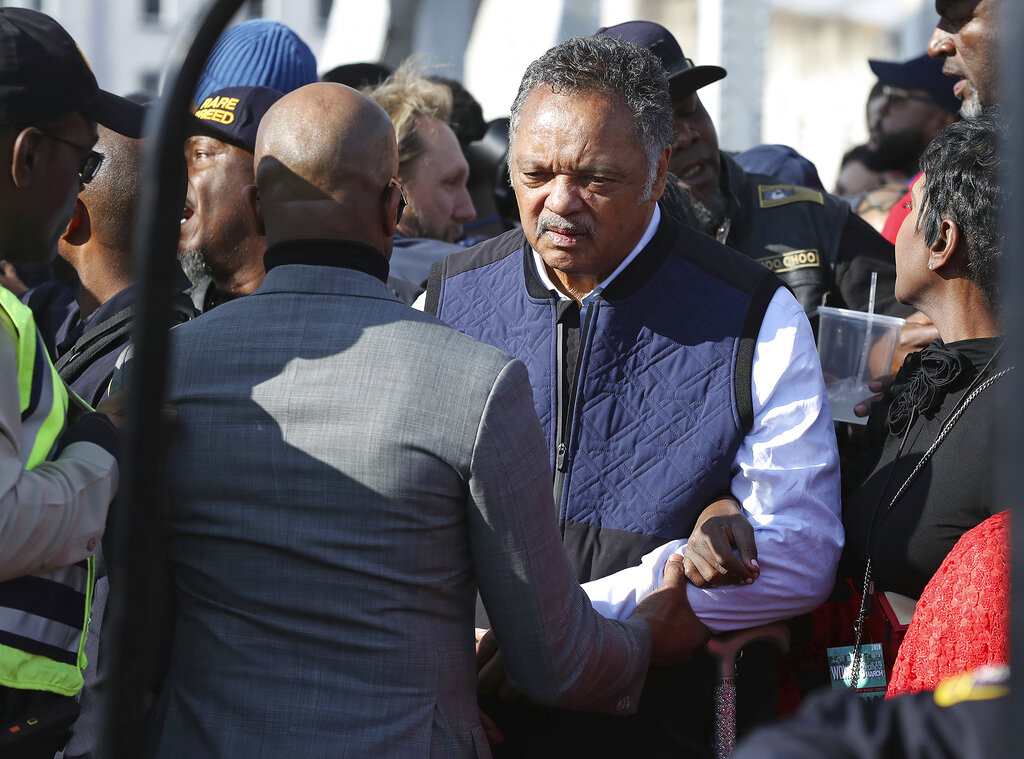
Biden and Sanders have been consolidating their support since Super Tuesday.
Lynching memorial and museum in Alabama draw crowds, tears
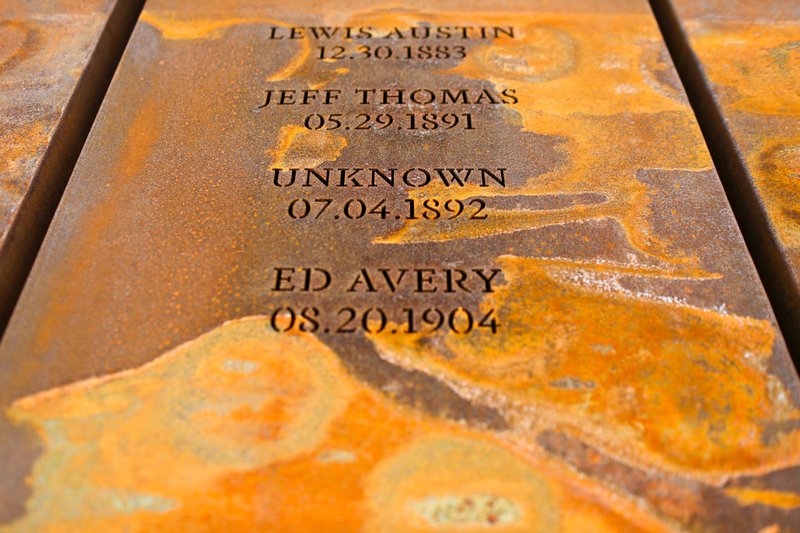
Tears and expressions of grief met the opening of the nation’s first memorial to the victims of lynching Thursday in Alabama. Hundreds lined up in the rain to get a first look at the memorial and museum in Montgomery. The National Memorial for Peace and Justice commemorates 4,400 black people who were slain in lynchings and other racial killings between 1877 and 1950. Their names, where known, are engraved on 800 dark, rectangular steel columns, one for each U.S. county where lynchings occurred. A related museum, called The Legacy Museum: From Enslavement to Mass Incarceration, is opening in Montgomery. Many visitors shed tears and stared intently at the commemorative columns, many of which are suspended in the air from above. Toni Battle drove from San Francisco to attend. “I’m a descendant of three lynching victims,” Battle said, her face wet with tears. “I wanted to come and honor them and also those in my family that couldn’t be here.” Ava DuVernay, the Oscar-nominated film director, told several thousand people at a conference marking the memorial launch to “to be evangelists and say what you saw and what you experienced here. … Every American who believes in justice and dignity must come here … Don’t just leave feeling like, ‘That was amazing. I cried.’ … Go out and tell what you saw.” As for her own reaction, DuVernay said: “This place has scratched a scab. It’s really open for me right now.” Angel Smith Dixon, who is biracial, came from Lawrenceville, Georgia, to see the memorial. “We’re publicly grieving this atrocity for the first time as a nation. … You can’t grieve something you can’t see, something you don’t acknowledge. Part of the healing process, the first step is to acknowledge it.” The Rev. Jesse Jackson, a longtime civil rights activist, told reporters after visiting the memorial that it would help to dispel America’s silence on lynching. “Whites wouldn’t talk about it because of shame. Blacks wouldn’t talk about it because of fear,” he said. The crowd included white and black visitors. Mary Ann Braubach, who is white, came from Los Angeles to attend. “As an American, I feel this is a past we have to confront,” she said as she choked back tears. DuVernay, Jackson, playwright Anna Deavere Smith, the singing group Sweet Honey in the Rock, Congressman John Lewis and other activists and artists spoke and performed at an opening ceremony Thursday night that was by turns somber and celebratory. Among those introduced and cheered with standing ovations were activists from the 1950s Montgomery bus boycott, Freedom Rider Bernard Lafayette, and one of the original Little Rock Nine, Elizabeth Eckford. “There are forces in America today trying to take us back,” Lewis said, adding, “We’re not going back. We’re going forward with this museum.” Singer Patti Labelle ended the evening with a soulful rendition of “A Change is Gonna Come.” Other launch events include a “Peace and Justice Summit” featuring celebrities and activists like Marian Wright Edelman and Gloria Steinem in addition to DuVernay. The summit, museum and memorial are projects of the Equal Justice Initiative, a Montgomery-based legal advocacy group founded by attorney Bryan Stevenson. Stevenson won a MacArthur “genius” award for his human rights work. The group bills the project as “the nation’s first memorial dedicated to the legacy of enslaved black people, people terrorized by lynching, African-Americans humiliated by racial segregation and Jim Crow, and people of color burdened with contemporary presumptions of guilt and police violence.” Several thousand people gave Stevenson a two-minute standing ovation at a morning session of the Peace and Justice Summit. Later in the day, Edelman, founder of the Children’s Defense Fund, urged the audience to continue their activism beyond the day’s events on issues like ending child poverty and gun violence: “Don’t come here and celebrate the museum … when we’re letting things happen on an even greater scale.” Republished with the permission of the Associated Press.
Robert Bentley paramour Rebekah Mason behind effort to shut DMV offices in black counties, new report shows

Rebekah Mason, Gov. Robert Bentley’s former top adviser and illicit lover, pushed to close 31 offices of the Alabama Department of Motor Vehicles in mostly black counties. After protests by civil rights activists, including Jesse Jackson, the politically motivated effort was later overturned, resulting in a federal investigation. The relationship between Bentley and Mason and how it impacted the DMV closure plan was the focus of a new 131-page report, which the Birmingham News reports was released by investigators examining impeachment proceedings against the governor. The report, from lead investigator Jack Sharman, found Mason “proposed closing multiple driver’s license offices throughout the State” and asking Alabama Law Enforcement Agency to “put together a plan.” Sharman also noted that former ALEA head Spencer Collier – well-aware of Mason’s intent – was instructed to have a plan “rolled out in a way that had limited impact on Government Bentley’s political allies.” Collier reported the closure plan to Luther Strange, Alabama’s then-Attorney General, expressing concern over possible Voting Rights Act violations. The News reports that Collier eventually agreed to the closure plan, but through “objective measure based on processed transactions per year to determine which offices to close.” Mason’s plan, if enacted, would of save the state $200,000 – a small amount in a General Fund showing typical annual shortfalls between $100 million and $200 million. Bentley agreed to the plan, the report said, with a single exception: removing state Sen. Gerald Dial’s district from the list. Dial told the News he never spoke with Bentley about any closures and is not aware of which county was under consideration. The plan set off an investigation by the U.S. Department of Transportation, which discovered that the closures would hit rural counties hardest and disproportionately affect black neighborhoods, a violation of the 1964 Civil Rights Act. The NAACP, the nation’s leading civil rights organization, filed a lawsuit prompting the federal review. At first, Bentley was critical of DOT involvement in the investigation, which he said was political in nature. But after striking an agreement between state and federal agencies, ALEA agreed it would extend service hours for DMV offices in Alabama’s so-called “Black Belt.”
Birmingham mayor William Bell endorses Hillary Clinton in 2016
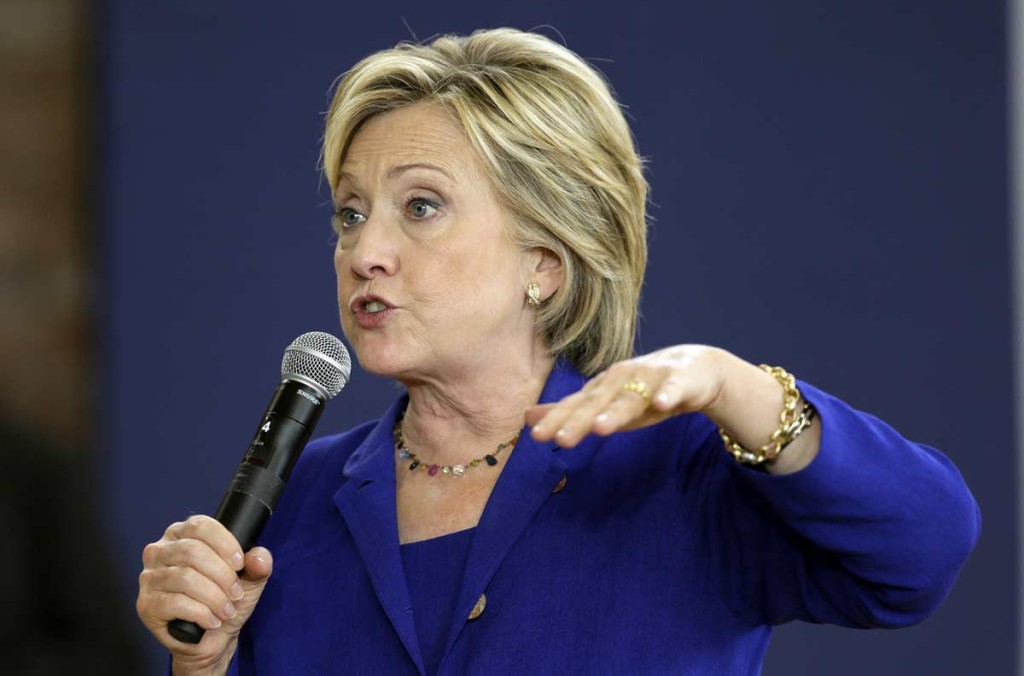
Birmingham Mayor William Bell was among 50 African-American city leaders to endorse the Democratic presidential bid of Hillary Rodham Clinton ahead of next year’s elections. Tuskegee Mayor Johnny Ford and James Perkins Jr., the former mayor of Selma, also endorsed Clinton. Both are Democrats, as is Mayor Bell. The endorsements come following Clinton’s visit to Birmingham on Saturday, to speak at the Alabama Democratic Conference‘s semi-annual convention in Hoover. “Hillary Clinton is the most experienced and most respected presidential candidate bar none,” former mayor Perkins said. “In 2016, America has the chance to elect a candidate in Hillary Clinton who has been putting people over special interests throughout her entire career and I’m proud to throw my support behind her.” “I am honored to have earned the endorsement of more than 50 African-American mayors across the country,” Clinton said, returning the favor in a statement. “Mayors are on the front lines of many of our country’s toughest battles. They’re fighting to create jobs, rebuild our infrastructure, stop gun violence, and eliminate the inequities that tear communities apart. “From the biggest cities to the smallest towns, what happens at the local level often leads to national change. Mayors make that happen. As president, I’ll always be a friend to America’s mayors.” Bell, a longtime Birmingham pol first elected to the City Council in 1979, also endorsed President Barack Obama during his re-election campaign in 2012 and lined up beside him on policy initiatives throughout his administration. Bell also appeared with the Rev. Jesse Jackson when the latter came to Alabama to denounce the announcement from Gov. Robert Bentley and the Legislature that cuts to that state budget would lead to the closure of several auxiliary DMV locations around rural parts of the state.
Gov. Robert Bentley discusses office closures with Jesse Jackson
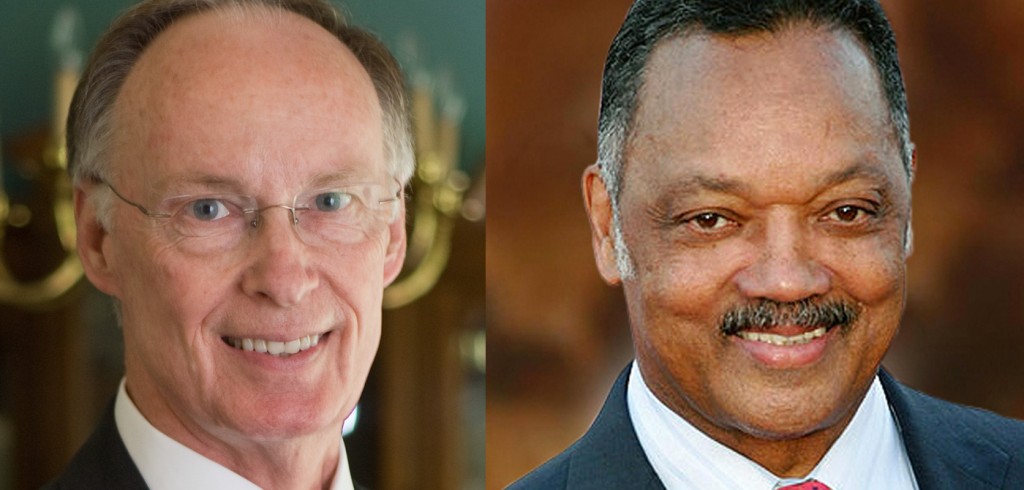
Alabama Gov. Robert Bentley met with the Rev. Jesse Jackson and black legislators concerned over the closure of drivers’ license offices in rural Alabama. Bentley held the meeting Wednesday afternoon following a week of criticism over the closures. Jackson said the closings will make it more difficult for people in rural, poor counties to obtain a driver’s license in a state that requires ID to vote. The Alabama Law Enforcement Agency announced that, because of budget cuts, it would no longer send driving test examiners to 31 satellite offices. The change impacts the issuance of new licenses. Replacements and renewals can still be done in local counties. Rep. John Knight of Montgomery questioned how much the state was saving since it was not eliminating positions or closing offices. Republished with permission of the Associated Press.
When candidates confront inaccurate, inflammatory comments

Donald Trump was hardly the first to face this situation and won’t be the last. Candidates are confronted with all sorts of comments on the campaign trail, including plenty that are inaccurate and some that are sure to offend. How should they respond? On Thursday, GOP presidential candidate Trump faced such a moment when a supporter at a town hall event complained about Muslims in the country and stated that President Barack Obama is Muslim. Actually he is Christian. Here’s a look at how Trump and other candidates before him have handled such situations. — – Donald Trump: “We have a problem in this country. It’s called Muslims,” began the questioner – the first Trump had selected at a post-debate rally in the early voting state of New Hampshire. “We know our current president is one. You know he’s not even an American,” the man said. Trump, who once was a driver of the “birther” movement that falsely claimed Obama wasn’t born in the U.S, first laughed off the question, but let the man continue. “We have training camps growing where they want to kills us. That’s my question. When can we get rid of it?” the questioner said. Trump, who has shot to the front of the GOP pack with his own controversial statements, did not dispute the man. “You know, a lot of people are saying that, and a lot of people are saying that bad things are happening out there,” Trump responded. “We’re going to be looking at that and plenty of other things.” Trump’s campaign manager later said that Trump had had trouble hearing in the busy room, though the man had been amplified by a microphone and could be heard by reporters seated in the back of the auditorium. — – John McCain: In 2008, Republican presidential nominee McCain took questions from several angry voters that became a signature moment of the campaign. One of the questioners said he was fearful of a possible Obama presidency. Another claimed the future president was Arab. “First of all, I want to be president of the United States and obviously I do not want Senator Obama to be. But I have to tell you, I have to tell you, he is a decent person and a person that you do not have to be scared as president of the United States,” said McCain. The response earned him boos from the crowd. He was equally quick to correct a woman who said of Obama: “He’s an Arab.” “No ma’am,” replied McCain. “He’s a decent, family man citizen that I just happen to have disagreements with on fundamental issues. And that’s what this campaign is all about.” — – Mitt Romney: In 2012 GOP nominee Mitt Romney faced his own criticism on the campaign trail for failing to correct inaccurate statements, including those from none other than Donald Trump. Romney declined repeatedly to correct Trump, then a much-courted donor, for repeatedly questioning Obama’s birth certificate and place of birth. Ahead of one fundraising event in Las Vegas, Trump repeated his suspicions that Obama was born outside the country and therefore was unqualified for the office of the president. Pressed by reporters to disavow Trump’s comments, Romney took a pass. “I don’t agree with all the people who support me. And my guess is they don’t all agree with everything I believe in,” Romney said. “But I need to get 50.1 percent or more.” He also thanked Trump at the event “for twisting the arms that it takes to bring a fundraiser together,” adding: “I appreciate your help.” — – Bill Clinton: Candidate Clinton had perhaps the best-known reaction to an inflammatory statement – though not one made to him at a campaign event – when he inserted himself into a racial conversation by denouncing a rap star who’d said in a newspaper interview that, “if black people kill black people every day, why not have a week and kill white people?” Clinton, who in 1992 was courting African-American voters, addressed the comments in detail during an appearance in front of Jesse Jackson‘s Rainbow Coalition. Clinton quoted extensively from the remarks the rapper had made to The Washington Post and then proceeded to denounce them. “I defend her right to express herself through music. But her comments before and after Los Angeles were filled with a kind of hatred that you do not honor today and tonight,” he said. “If you took the words white and black and you reversed them, you might think David Duke was giving that speech,” he added, referring to the white supremacist. Republished with permission of the Associated Press.


